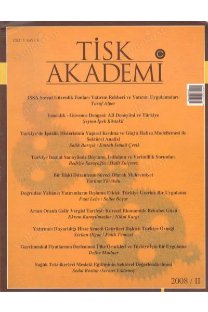Türkiye'de sendikalaşma ve verimlilik: Nedensellik analizi
Çalışma hayatının en önemli kurumsal aktörlerinden biri olan sendikaların yapmış olduğu faaliyetlerin verimlilik üzerinde etkili olup olmadığı tartışma konusudur. Klasik görüşe göre sendikalar verimliliği negatif yönde etkilemektedir. Ancak son yıllarda ağırlık kazanan modern teoriye göre, sendikaların ortaya çıkardığı çalışma ortamı, verimliliği pozitif yönde etkilemektedir. Çalışmada, 1991-2005 dönemine ait 7 sektörün altı aylık verileri kullanılarak, sendikalaşma ile verimlilik arasındaki ilişkiler panel nedensellik analizi çerçevesinde incelenmiştir. Çalışmanın bulgularına göre sendikalaşma oranı ile verimlilik arasında istatistiksel olarak anlamlı bir nedensellik ilişkisi yoktur. JEL Sınıflaması: J21, J33, J51
Unionization and productivity in Turkey: Causation analysis
The main purpose of labour unions, which are one of the most important institutions of labour markets, is to improve economic gains and work conditions of their members. According to classical approach, unions have a negative effect on productivity. However modern approach which is most popular in recent years claims that work environment provided by unions has positively effect on productivity. In this study, the existence of the causal relationship between unionization and productivity was investigated by using panel causality analysis for the seven sectors for the 1991-2005 semi-annual periods. According to the finding, there is not a statistically relationship between unionization and productivity. JEL Classification: J21,J33, J51
___
- Aymankuy, Ş. Y. (2005), "Konaklama İşletmelerinde Sendikaların Hizmet Kalitesine Etkileri", Balıkesir Üniversitesi, Sosyal Bilimler Enstitüsü Dergisi, 8. Cilt, Sayı: 18, s.1-23.
- Bemmels, J. J. (1987), "How Unions Affect Productivity in Manufacturing Plants", Industrial and Labor Relations Review, Nr.40, pp.241-253.
- Brown, C; Medoff, J. (1978), "Trade Union in the Production Process", Journal of Labor Economics, Vol. 86, Nr.3 pp.355-378.
- Byrne, D.; Dezhbakhsh, H.; King, R. (1996), "Unions and Police Productivity: An Econometric Investigation", Industrial Relations, Vol. 35, Nr.4, pp.566-584.
- Chand J. (2006),"Tests of the Solow Efficiency Wage Model Using Australian Aggregate Industry and Macro Economic Time Series Data" School of Economics at the University of New South Wales.
- Clark B. K. (1984), "The Impact of Unionization on Productivity: A Case Study", Industrial and Labor Relations Review, Vol. 33,No.4,pp.451-468.
- Clark B. K. (1984),"Unionization and Firm Performans: The Impact of Profits, Growth and Productivity", American Economic Review, Nr.74, pp.893-919.
- Coondoo, D.; Soumyananda, D. (2002), "Causality Income and Emission : A Country Group Specific Econometrics Analysis, Ecological Economics, Nr. 40 , pp.351-367.
- ÇSGB (Çalışma ve Sosyal Güvenlik Bakanlığı), Çalışma Hayatı İstatistikleri, ÇSGB Yayınları, No: 17-30, 1991-2004.
- Denny, K. (1997), "Productivity and Trade Unions in British Manufacturing Industry 1973-1985", Applied Economics, Nr.27, pp.1403-1409.
- Ehrenberg, R.; Smith, R. S. (1985), Modern Labor Economics : Theory and Public Policy, Second Edition, Scott-Foresman And Company, London.
- Freeman, B. R.; Medoff, L. J. (1979), "Two Faces of Unionism", The Public Interest, Nr.57, pp.69-93.
- Gündoğan, N. (1997), "Sendikalar ve Verimlilik", Verimlilik Dergisi, s. 17-26
- Hirsch, T. B.; Link, N. A. (1984), "Unions, Productivity and Productivity Growth", The Journal of Labor Research, Vol.5, Nr.l,pp.29-37.
- Holtz-Eakin D.; W. Newey ve H. Rosen (1990), 'Estimating Vector Autoregressi ons with Panel Data', Econometrica, 56:1371-95.
- Koksal, B.; Özgür, E.; Güler, H. (2004),"Etkin Ücret Teorileri: Türk İmalat Sanayi Uygulaması" İktisat İşletme Finans, 2004, Vol. 19, No. 222, pp. 91-106.
- Levin, A.; Lin, C. (1992), "Unit Root Test in Panel Data: Asymptotic and Finite Sample Properties", Discussion Paper.
- Mitchell, M. W; Stone A. J. (1992), "Union Effect on Productivity: Evidence from Western Sawmills", Industrial and Labor Relations Review, Nr.46, pp. 135-145.
- Özkaplan, N. (1994), "Sendikalar ve Ekonomik Etkileri: Türkiye Üzerine Bir Uygulama", Kavram Yayınları, No.2, İstanbul.
- TCMB (Türkiye Cumhuriyet Merkez Bankası) (2007), EVDS (Elektronik Veri Dağıtım Sistemi), http://www.tcmb.gov.tr
- Turan, G. (2001), "Sendikaların Verimlilik Üzerine Etkileri", CMİS, 2001 (Mart), s. 20-28.
- ISSN: 1306-6757
- Yayın Aralığı: Yılda 2 Sayı
- Başlangıç: 2006
- Yayıncı: Türkiye Isveren Sendikalari Konfederasyonu
Sayıdaki Diğer Makaleler
Müşteri saldırganlığı: Yaygınlığı ve aktörleri (bir alan araştırması)
İşgücü piyasasında illerin işsizlik risklerinin analitik hiyerarşi süreci ile belirlenmesi
Hüseyin TATLIDİL, Barış ÖZGÜRLÜK
Türkiye'de sendikalaşma ve verimlilik: Nedensellik analizi
Alternatif kriz yaklaşımı: Beyin kazanımı ve teknogirişimcilik
Türkiye'de 1981-2000 döneminde sanayi kesiminde enerji tüketiminin ayrıştırılması
A. Hakan ÇERMİKLİ, Harun ÖZTÜRKLER
Tükenmişlik ve üretkenlik karşıtı davranışlar arasındaki ilişkinin kavramsal boyutu
